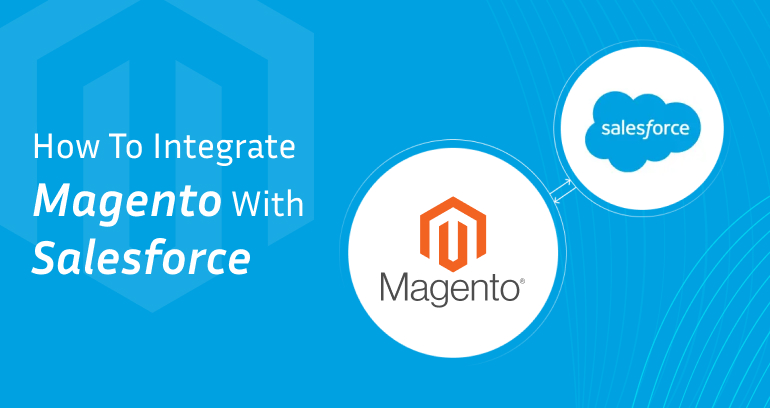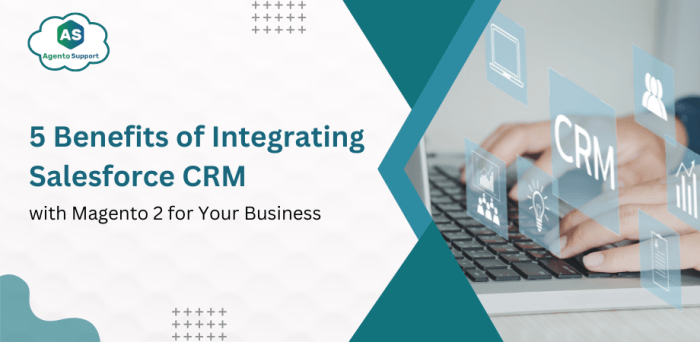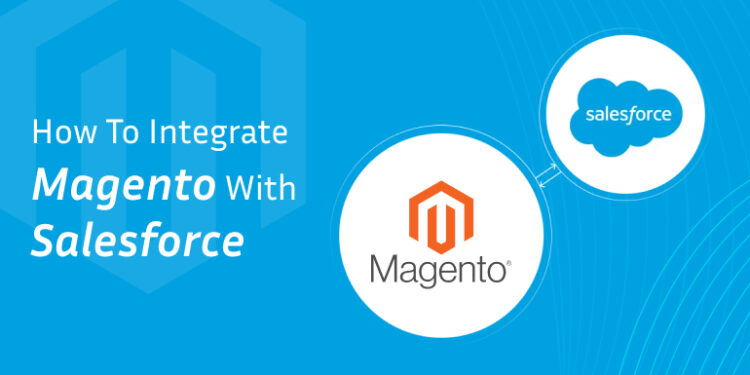Embark on a journey into the world of Integrating Magento with Your CRM: What You Need to Know. Discover the intricacies of merging these powerful tools to elevate your e-commerce game to new heights.
Delve into the complexities of data synchronization, automation, and user training to ensure a seamless integration process.

 When integrating Magento with your CRM system, providing adequate user training and ongoing support for employees is crucial for ensuring smooth operations and maximizing the benefits of the integration. Here are some key points to consider:
When integrating Magento with your CRM system, providing adequate user training and ongoing support for employees is crucial for ensuring smooth operations and maximizing the benefits of the integration. Here are some key points to consider:
 As we wrap up our discussion on Integrating Magento with Your CRM: What You Need to Know, remember the key takeaways and insights shared. Let this guide steer you towards successful integration and enhanced efficiency in your business operations.
As we wrap up our discussion on Integrating Magento with Your CRM: What You Need to Know, remember the key takeaways and insights shared. Let this guide steer you towards successful integration and enhanced efficiency in your business operations.

Understanding the Basics
Magento is a popular e-commerce platform that enables businesses to create online stores and manage their digital sales. It offers a wide range of features, including product catalog management, order processing, payment integration, and customer account management.Customer Relationship Management (CRM) software is a tool used by businesses to manage interactions with current and potential customers. It helps companies streamline processes, improve customer relationships, and ultimately drive sales growth.The Benefits of Integrating Magento with a CRM System
Integrating Magento with a CRM system can provide several advantages for businesses looking to optimize their e-commerce operations and enhance customer relationships. Here are some key benefits:- Streamlined Data Management: By integrating Magento with a CRM system, businesses can centralize customer data, order information, and other important details in one place. This leads to improved data accuracy and easier access to information for sales and marketing teams.
- Enhanced Customer Insights: The integration allows for a more comprehensive view of customer behavior, preferences, and purchase history. This data can be used to personalize marketing campaigns, offer targeted promotions, and provide a better overall shopping experience.
- Improved Sales and Marketing Alignment: With Magento and CRM integration, sales and marketing teams can work together more effectively. Sales reps can access customer data and insights from the CRM system directly within Magento, enabling them to tailor their interactions and follow-ups based on customer preferences.
- Automation of Processes: Integrating Magento with a CRM system can automate various tasks such as lead generation, order processing, and customer follow-ups. This automation helps businesses save time, reduce manual errors, and increase efficiency in managing customer relationships.
- Better Customer Service: By having a unified view of customer interactions and purchase history, businesses can provide more personalized and timely customer support. This leads to higher customer satisfaction levels and increased loyalty.
Choosing the Right CRM for Magento Integration
When it comes to integrating Magento with a CRM system, choosing the right CRM is crucial for the success of your business operations. Here are some key factors to consider when selecting a CRM system that is compatible with Magento:Key Factors to Consider
- Compatibility: Ensure that the CRM system you choose is compatible with Magento to enable seamless integration without any issues.
- Features and Functionality: Evaluate the features and functionality of the CRM system to ensure it meets your business requirements and enhances your workflow.
- Scalability: Consider the scalability of the CRM system to accommodate your business growth and increasing data needs over time.
- User-Friendly Interface: Opt for a CRM system that offers an intuitive and user-friendly interface to facilitate easy adoption by your team members.
- Customization Options: Look for a CRM system that provides customization options to tailor the platform according to your specific business needs.
Popular CRM Options Compatible with Magento
- Salesforce:Salesforce is a widely-used CRM system that offers robust features and seamless integration capabilities with Magento.
- HubSpot:HubSpot provides a user-friendly CRM platform with powerful marketing automation tools that can be integrated with Magento for enhanced customer management.
- Zoho CRM:Zoho CRM is known for its affordability and scalability, making it a popular choice for businesses looking to integrate with Magento.
- Microsoft Dynamics 365:Microsoft Dynamics 365 offers a comprehensive CRM solution with advanced customization options and seamless integration with Magento.
Evaluating CRM Compatibility with Magento
- Consult with CRM Experts: Seek advice from CRM experts or developers who have experience with integrating CRM systems with Magento to guide you in choosing the right platform.
- Compatibility Testing: Conduct thorough compatibility testing between the CRM system and Magento to ensure that data synchronization and workflows function smoothly.
- Vendor Support: Consider the level of vendor support available for the CRM system to provide assistance in case of any integration challenges or technical issues.
Integration Methods and Tools
When it comes to integrating Magento with a CRM, there are several methods and tools available to streamline the process and ensure seamless data exchange between the two platforms.Manual Integration Steps
To manually integrate Magento with your CRM, follow these step-by-step instructions:- Identify the data fields you want to sync between Magento and your CRM.
- Create a mapping document to match the fields from both systems.
- Implement API calls or custom scripts to transfer data between Magento and your CRM.
- Test the integration thoroughly to ensure that data is syncing accurately.
- Monitor the integration regularly to address any issues that may arise.
Third-Party Tools and Extensions
Using third-party tools or extensions can simplify the integration process and offer additional features for syncing data between Magento and your CRM. Some popular tools and extensions include:- Magento CRM Connectors:These connectors provide pre-built integrations with popular CRMs like Salesforce, HubSpot, and Zoho CRM.
- Data Migration Tools:Tools like Cart2Cart or LitExtension can help migrate data from Magento to your CRM seamlessly.
- Custom Integration Services:Companies like Zapier or PieSync offer custom integration services to connect Magento with your CRM based on your specific requirements.
Data Synchronization and Automation
Data synchronization and automation play a crucial role in integrating Magento with your CRM system. By ensuring that data is accurately shared and updated between the two platforms, businesses can streamline processes, improve decision-making, and enhance overall efficiency.Importance of Data Synchronization
Data synchronization is essential to maintain consistency and accuracy of information across Magento and CRM systems. It ensures that customer data, order details, product information, and other relevant data are consistently updated and aligned between the two platforms.- Prevents data discrepancies: Synchronizing data helps in avoiding inconsistencies or errors that may arise from manual data entry or outdated information.
- Enhances customer experience: By having up-to-date customer information in both Magento and CRM, businesses can provide personalized services and targeted marketing campaigns.
- Improves decision-making: Accurate and synchronized data allows for better analytics, reporting, and forecasting, enabling informed business decisions.
Automation for Streamlining Processes
Automation in data integration between Magento and CRM can significantly reduce manual efforts, minimize errors, and expedite workflows. It enables seamless communication and data transfer between the two systems, leading to increased operational efficiency.- Automated data entry: Integration tools can automate the transfer of data, such as customer details, orders, and inventory updates, eliminating the need for manual input.
- Workflow automation: Automation can streamline processes like order processing, inventory management, and customer communication, saving time and resources.
- Real-time updates: Automated synchronization ensures that data is updated in real-time, providing accurate information for immediate action.
Best Practices for Maintaining Accurate Data
To ensure that data remains consistent and reliable across Magento and CRM platforms, businesses should follow best practices for data management and synchronization.- Regular data audits: Conduct periodic audits to identify and rectify any discrepancies or outdated information in both systems.
- Data mapping: Define clear mapping rules for data fields to ensure seamless integration and accurate data transfer between Magento and CRM.
- Data validation: Implement validation checks to maintain data integrity and prevent errors during synchronization processes.
User Training and Support
 When integrating Magento with your CRM system, providing adequate user training and ongoing support for employees is crucial for ensuring smooth operations and maximizing the benefits of the integration. Here are some key points to consider:
When integrating Magento with your CRM system, providing adequate user training and ongoing support for employees is crucial for ensuring smooth operations and maximizing the benefits of the integration. Here are some key points to consider:
Designing a User Training Program
- Identify key users: Determine who will be using the integrated systems on a daily basis and tailor the training program to their specific needs and roles.
- Hands-on training: Offer practical, hands-on training sessions to give employees the opportunity to familiarize themselves with the new systems and workflows.
- Provide documentation: Create user manuals, guides, and tutorials to serve as reference materials for employees to consult whenever they need assistance.
Creating a Troubleshooting Guide
- Common integration issues: Identify common issues that may arise during the integration process and provide step-by-step troubleshooting guides to help users resolve these issues quickly.
- Escalation process: Establish an escalation process for more complex issues that cannot be resolved through the troubleshooting guide, ensuring that users have access to the necessary support resources.
- Regular updates: Keep the troubleshooting guide up to date with new issues and solutions as they arise, ensuring that employees always have access to the most current information.
Role of Ongoing Support
- Help desk support: Provide a dedicated help desk or support team to assist users with any questions or issues they may encounter while using the integrated systems.
- Training refreshers: Offer periodic training refreshers to reinforce key concepts and ensure that employees are making the most of the integrated systems.
- Feedback loop: Establish a feedback loop to gather input from users about their experiences with the integrated systems, allowing you to make improvements and address any recurring issues.
Epilogue
 As we wrap up our discussion on Integrating Magento with Your CRM: What You Need to Know, remember the key takeaways and insights shared. Let this guide steer you towards successful integration and enhanced efficiency in your business operations.
As we wrap up our discussion on Integrating Magento with Your CRM: What You Need to Know, remember the key takeaways and insights shared. Let this guide steer you towards successful integration and enhanced efficiency in your business operations.













